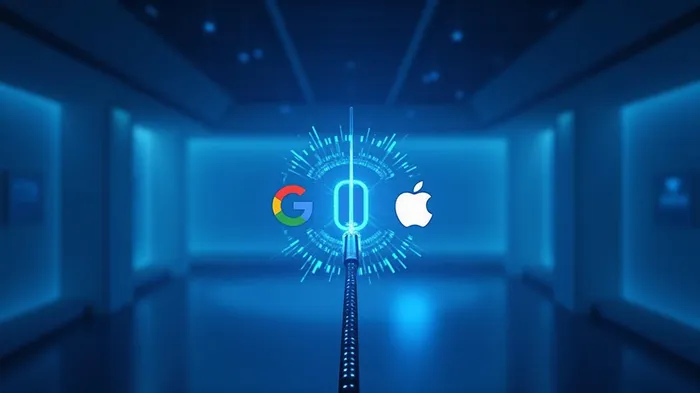Google and Apple’s Gemini Partnership: A Game-Changer or Regulatory Hurdle?

Lead: On April 29, 2025, GoogleGOOG-- CEO Sundar Pichai dropped a bombshell during federal antitrust testimony: the company is racing to finalize a deal with Apple to integrate its Gemini AI into Apple devices by mid-2025. If realized, this partnership could redefine smartphone and desktop AI capabilities—but it’s not without hurdles.
The Gemini-Apple Partnership: A Strategic Move
The revelation that Google and Apple are negotiating to embed Gemini into Apple’s upcoming iOS, iPadOS, and macOS updates marks a seismic shift. For Apple, it’s a bid to close its AI gap with rivals like Microsoft (which has OpenAI deeply integrated into Windows) and Samsung. For Google, it’s a chance to extend its AI dominance beyond search and cloud services.
Pichai emphasized during testimony that discussions with Apple CEO Tim Cook began in 2024, with a potential announcement at Apple’s WWDC conference in June. The integration could debut alongside iOS 19 and the iPhone 17 in late 2025. Key to the deal is Gemini’s versatility: its Nano model (optimized for mobile) and Pro variant (for cloud tasks) could power smarter Siri interactions, document summarization, and proactive suggestions.
However, Apple’s privacy-first ethos complicates things. The integration would likely follow ChatGPT’s sandboxed model—restricted access to core data like emails or calendars—to comply with strict privacy policies. “This isn’t a free-for-all for Google’s AI,” notes tech analyst Carolina Milanesi. “Apple will guard user data fiercely, even if it limits Gemini’s full potential.”
Technical Implications and Competitive Landscape
Gemini’s capabilities are formidable. Version 2.5 Pro, already ranked #1 on the Chatbot Arena benchmark, can handle complex coding, legal analysis, and multi-step reasoning. Its Flash variant offers cost-efficient performance for routine tasks. Meanwhile, Google’s broader AI push—including AI Mode in Search and the Agentspace platform—hints at a vision for AI-driven productivity.
But the race isn’t just about tech specs. Microsoft’s Windows Copilot, powered by OpenAI, already offers AI-driven task automation. Samsung’s AI Galaxy features, while less advanced, have gained traction in the mid-range market. Apple’s move with Gemini must deliver a clear leap forward to justify the collaboration.
“Apple’s users demand seamless integration without compromising privacy,” says Forrester’s J.P. Gownder. “If Gemini can do that, it could be a winner. If not, it’s just another half-baked feature.”
Regulatory Challenges and Market Outlook
The deal faces scrutiny from the U.S. Department of Justice, which is already litigating Google’s antitrust practices. Critics argue that tying Apple’s devices to Google’s AI could reinforce its market dominance. “This isn’t just about AI—it’s about control over the user experience,” says antitrust lawyer Mara Vanina.
Investors, however, are cautiously optimistic. Google’s AI Overviews now serve 1.5 billion monthly users, and AI Mode in Search is driving longer, more complex queries. If Gemini’s integration boosts engagement or opens new revenue streams (e.g., premium AI services), it could justify Google’s $1.8 trillion market cap.
Apple, meanwhile, faces pressure to innovate post-CEO Tim Cook’s tenure. A successful Gemini partnership could reinvigorate its declining iPhone sales growth, which dipped to 1.2% in Q1 2025.
Conclusion: A High-Reward, High-Risk Gamble
The Google-Apple Gemini deal is a bold move with transformative potential—but it hinges on execution. If the duo can balance Gemini’s power with Apple’s privacy standards, it could set a new benchmark for consumer AI. However, regulatory roadblocks and competitive pressure loom large.
For investors, the takeaway is clear: watch both companies’ Q3 2025 earnings for clues on adoption rates and regulatory outcomes. The stakes are enormous: success here could make Gemini the default AI for hundreds of millions of users, while failure might cement Apple’s reputation as a laggard in the AI era.
Avi Salzman’s analysis synthesizes tech trends, regulatory risks, and market data to offer actionable insights for investors navigating the AI revolution.
Tracking the pulse of global finance, one headline at a time.
Latest Articles
Stay ahead of the market.
Get curated U.S. market news, insights and key dates delivered to your inbox.

Comments
No comments yet